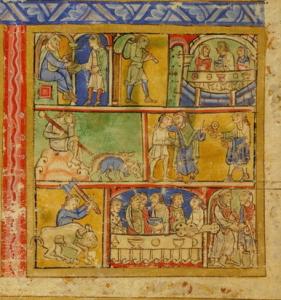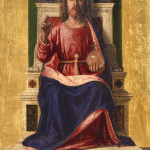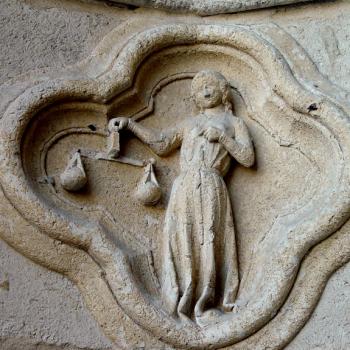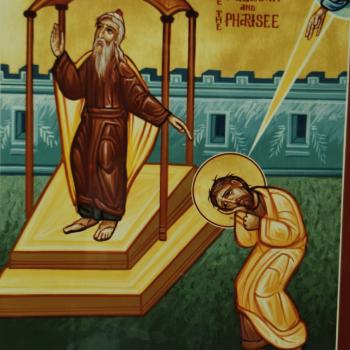
In the parable of the Prodigal Son, we hear about a man who had two sons. One of them, the younger of the two, asked his father to be given his inheritance so he could go off and live life as he saw fit. Because he loved his son, the father did as he was asked, however saddened he was to do so. The elder son, on the other hand, stayed with his father, and helped him take care of his property. Much later, the younger son, having used up all his funds, found himself in a rather dire situation: a famine was going through the region, and, having no money of his own, had to make do with what work he could find if he was going to survive. He was hired a swineherd, but he found it demeaning, as he believed the swine was better fed than he; considering the situation he was in, he believed he could fare better if he returned to his father and worked for him as a servant. He knew his father was respectful towards his servants. And so the younger son made his way back home; his father, upon seeing his son returning, wanted to celebrate. He had a fatted calf taken and prepared for a feast. The elder son, not knowing what was going on, heard some commotion and decided to investigate:
Now his elder son was in the field; and as he came and drew near to the house, he heard music and dancing. And he called one of the servants and asked what this meant. And he said to him, `Your brother has come, and your father has killed the fatted calf, because he has received him safe and sound.’ But he was angry and refused to go in. His father came out and entreated him, but he answered his father, `Lo, these many years I have served you, and I never disobeyed your command; yet you never gave me a kid, that I might make merry with my friends. But when this son of yours came, who has devoured your living with harlots, you killed for him the fatted calf!’ (Lk. 11:25-30 RSV).
While the parable is often seen to represent the way God treats wayward humanity by examining how the father could represent God and the prodigal son represents us, sinners who have abandoned God. Such discussions explain that God will welcome us back, no matter what we have done, and bless us in the way the father blessed his wayward son when he returned home. This is certainly an important message, and central to the parable. God wants to shower us with love, and can even be said to celebrate with us when we come to receive it. No matter what we have done, that love is there for us to take, and with it, we can and will receive all kinds of blessings from God. This is not to say we should not care about what we have done, because, of course, all the bad habits, and all the experiences we have had, will have an impact upon us, and we will have to work it all out, but in doing so, we can have God’s blessings, indeed, it is only with God’s blessings, God’s grace, that we can truly do so.
There are other things we can learn from the parable. Connected with the main point is another, that is, when we see anyone ask God for a blessing, no matter what kind of life they have lived, we should see it as a good thing and not get in the way. We certainly should not be envious of them and what God grants them. Sadly, so many people, especially many religious people, are like the elder son. They think they alone should receive what God has to offer, and they will question how or why God would bless sinners similar to the way the elder son talked about his brother and the kind of life his brother had lived (“who has devoured your living with harlots”).
The elder son did not make the same mistakes his younger brother did. But what he did not understand was that he himself was making a huge mistake. He said he had been there with his father, but he had not entirely embraced the way of his father and indeed, though he was physically there with his father, he was not of one heart with his father. With his complaint, he turned his back on his father and begun to make the same kind of journey his younger brother had previously undertaken. Thus, it would seem, his father understood this, which is why he told the older brother not to worry, he would get what was coming to him, realizing that the elder son now was concerned about his inheritance just like the younger son had been.
The parable does not tell us what the elder son did after his father explained himself. That is because we are to put ourselves in the place of the elder son and ponder what we should do. We should consider how are we going to react now when we see God blessing those whom we believe have squandered the blessing God initially gave to them. Are we going to be bitter, and complain, or are we going to recognize that God loves everyone, and plans to share blessings with everyone? We can either be welcoming to those who come to God seeking a blessing, rejoicing when they do so, or we can be like the elder son, and resent the fact that they get a blessing just like us because we think their sins should preclude them from receiving it. Either we will share with God the love God has for all, or we can become self-assured and self-righteous, and in doing so, fall from that love just as much as those we try to condemn.
We should hope we should not become like the elder son. We should strive to follow the way of God and God’s love. We should try, as much as we can, to deny the urge to downplay others by proclaiming their sins to the public. We should not get in the way of others when they come for a blessing, for when we do so, we end up undermining our own connection to God and God’s love; we risk becoming the ones who do not receive the blessing which we could and should receive.
Stay in touch! Like A Little Bit of Nothing on Facebook.
If you liked what you read, please consider sharing it with your friends and family!
N.B.: While I read comments to moderate them, I rarely respond to them. If I don’t respond to your comment directly, don’t assume I am unthankful for it. I appreciate it. But I want readers to feel free to ask questions, and hopefully, dialogue with each other. I have shared what I wanted to say, though some responses will get a brief reply by me, or, if I find it interesting and something I can engage fully, as the foundation for another post. I have had many posts inspired or improved upon thanks to my readers.













